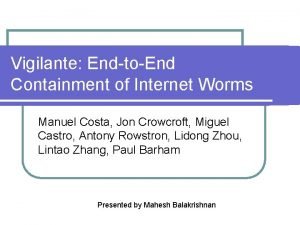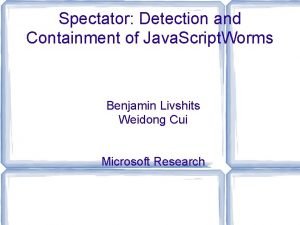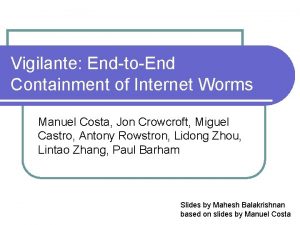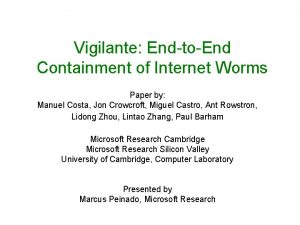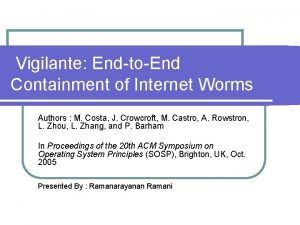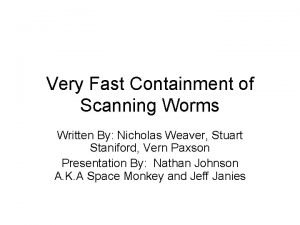Vigilante EndtoEnd Containment of Internet Worms Manuel Costa























- Slides: 23

Vigilante: End-to-End Containment of Internet Worms Manuel Costa, Jon Crowcroft, Miguel Castro, Antony Rowstron, Lidong Zhou, Lintao Zhang, Paul Barham Presented by Mahesh Balakrishnan

Worms l The Morris Worm… 1988 l l l l Zotob – Aug 2005, Windows Plug-and-Play Sasser – May 2004, Windows LSASS Mydoom – Jan 2004, email So. Big, Aug 2003, email Blaster – Aug 2003, Windows RPC Slammer – Jan 2003, SQL Nimda – Sep 2001, email + IE Code. Red – July 2001, IIS

The Anatomy of a Worm l Replicate, replicate, replicate… exponential growth l Exploit Vulnerability in Network-facing Software l Worm Defense involves Detection – of what? l Response l

Existing Work l Network l Level Approaches … Polymorphic? Slow worms? l Host-based Approaches: Instrument code extensively. Slow (? )… l Do it elsewhere: Honeypots… honeyfarms l Worm Defense now has three components: Detection, Propagation, Response

Vigilante l Automates worm defense l ‘Collaborative Infrastructure’ to detect worms l Required: Negligible rate of false positives l Network-level approaches do not have access to vulnerability specifics

Solution Overview Run heavily instrumented versions of software on honeypot or detector machines l Broadcast exploit descriptions to regular machines l Generate message filters at regular machines to block worm traffic l Requires separate detection infrastructure for each particular service: is this a problem? l

SCA: Self-Certifying Alert l Allows exploits to be described, shipped, and reproduced l Self-Certifying: to verify authenticity, just execute within sandbox l Expressiveness: Concise or Inadequate? l Worms defined as ‘exploiters of vulnerability’ rather than ‘generators of traffic’

Types of Vulnerabilities Arbitrary Execution Control: message contains address of code to execute l Arbitrary Code Execution: message contains code to execute l Arbitrary Function Argument: changing arguments to ‘critical’ functions. e. g exec l Is this list comprehensive? l l l C/C++ based vulnerabilities… what about email-based worms – So. Big, Mydoom, Nimda?

Example SCA: Slammer Address of code to execute is contained at this offset within message Execution Control SCA

Alert Generation l Many existing approaches l Non-executable pages: faster, does not catch function argument exploit l Dynamic Data-flow Analysis: track dirty data l Basic Idea: Do not allow incoming messages to execute or cause arbitrary execution

Alert Verification l Hosts run same software with identical configuration within sandbox l Insert call to Verified instead of: Address in execution control alerts l Code in code execution alerts l l Insert a reference argument value instead of argument in arbitrary function argument alert

Alert Verification is fast, simple and generic, and has no false positives l Assumes that address/code/argument is supplied verbatim in messages l l l Works for C/C++ buffer overflows, but what about more complex interactions within the service? Assumes that message replay is sufficient for exploit reproduction l l Scheduling policies, etc? Randomization?

Alert Distribution l Flooding over secure Pastry overlay l What about DOS? Don’t forward already seen or blocked SCAs l Forward only after Verification l Rate-limit SCAs from each neighbor l l Secure l Pastry? Infrastructural solution… super-peers

Distribution – out-crawling the worm l l l Worm has scanning inefficiencies; Slammer doubled every 8. 5 seconds. The myth of the anti-worm… We have perfect topology: around the world in seconds! What if the worm discovers our topology? Infrastructural support required – wormresistant super-peers! Is this sterile medium of transport deployable?

Local Response l Verify SCA l Data and Control Flow Analysis l Generate filters – conjunctions of conditions on single messages l Two levels : general filter with false positives + specific filter with no false positives

Evaluation l Target l Slammer – 75, 000 SQL servers, 8. 5 seconds to double l l Execution Control Alert Code Red – 360, 000 IIS servers, 37 minutes to double l l Worms Code Execution Alert Blaster – 500, 000 Windows boxes, doubling time similar to Code. Red l Execution Control Alert

Evaluation: Alert Generation SCA Generation Time SCA Sizes

Evaluation: Alert Verification l Verification is fast - Sandbox VM constantly running … Verification Time Filter Generation

Simulation Setup l Transit Stub Topology: 500, 000 hosts l Worm propagation using epidemic model l 1000 super-peers that are neither detectors nor susceptible! l Includes modeling of worm-induced congestion

Number of Detectors… l ~0. 001 detectors sufficient… 500 nodes

Real Numbers l 5 -host network: 1 detector + 3 superpeers + 1 susceptible on a LAN l Time between detector probe to SCA verification on susceptible host: Slammer: 79 ms l Blaster: 305 ms l Code. Red: 3044 ms l

The Worm Turns l Outwitting Vigilante One interesting idea, courtesy Saikat: Detect instrumented honeypots via timing differences. Does this work? l Layered exploits: one for the super-peer topology, another for the hosts l Ideas? l

Conclusion l End-to-end solution for stopping worms l Pros: No false positives l Per-vulnerability reaction, not per-variant: handles polymorphism, slow worms l l Concerns: Limited to C/C++ buffer overflow worms l Infrastructural solution – scope of deployment? l
 Reckless containment theory
Reckless containment theory Vigilante de keryado
Vigilante de keryado Asocea protocolo
Asocea protocolo Portugaise poilu
Portugaise poilu Manuel costa
Manuel costa Internet or internet
Internet or internet Interim containment actions
Interim containment actions Accent cost containment solutions
Accent cost containment solutions Oil spill
Oil spill Nicholas tsourmas
Nicholas tsourmas Maximum containment laboratory
Maximum containment laboratory Containment in java
Containment in java What was the policy of containment
What was the policy of containment Strengths of differential association theory
Strengths of differential association theory Sorbweb
Sorbweb What is a satellite nation
What is a satellite nation Containment in java
Containment in java Cubakrisen årsaker
Cubakrisen årsaker Containment definition cold war
Containment definition cold war Where is the deadman on a fiberglass tank
Where is the deadman on a fiberglass tank Father of containment
Father of containment The cold war
The cold war Open skies apush
Open skies apush Opw 687
Opw 687




